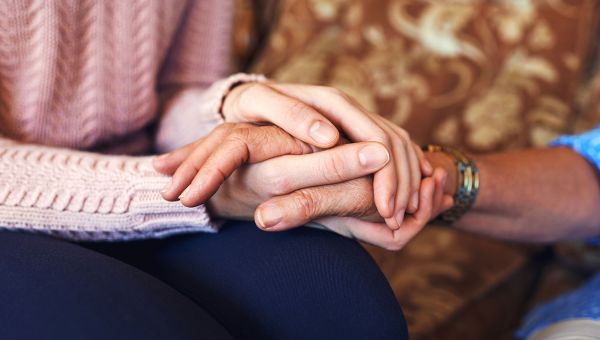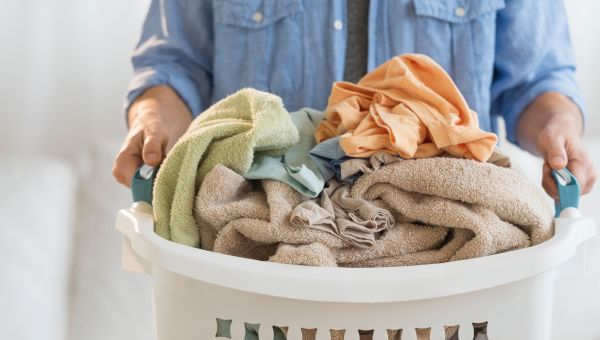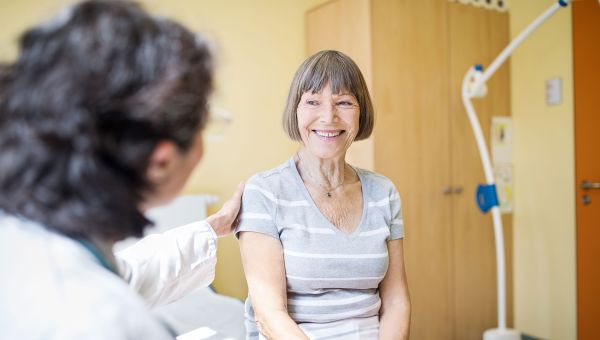6 ways to help a loved one with breast cancer
Give your friend or family member the support they really need through a difficult time.
Updated on July 18, 2024

When a friend or family member is diagnosed with breast cancer, many people don’t know how to react—or help. What can I really do? Will I say the wrong thing? Do they even want my help?
While there’s no one-size-fits-all answer, it’s important to support your loved one throughout diagnosis, treatment, and recovery. Studies suggest that people with breast cancer who have support from their friends, families, and even online groups have better outcomes following treatment, as well as higher rates of survival. Increased support from family may also help to prevent depression following a breast cancer diagnosis.
Not sure how you can help? We spoke with Ioana Hinshaw, MD, a medical oncologist with Presbyterian/St. Luke's Medical Center in Denver, Colorado, to learn the best ways to help a loved one with breast cancer.

Be present
A cancer diagnosis can be a scary for a patient’s loved ones, too. But during this daunting time in your friend or family member’s life, being present and offering to talk—about any subject, from their diagnosis to why the sky is blue—is key.
“Many people feel uncomfortable because they don’t know what to say to a patient diagnosed with cancer. They don’t know how to react. I’ve seen a lot of people avoid contact simply because they don’t know what to say,” Dr. Hinshaw says.
Reaching out to your friend or family member and even saying something as simple as “I’m thinking of you” or “What can I do to help?” can be tantamount to their mental and emotional well-being.
Many people worry that they will be treated differently or that their relationships will be altered as a result of their illness. It’s also important to ensure your loved one knows they have your support, despite changes in their mood, abilities or appearance. “The most important thing is to be there to talk and reassure them that nothing has changed in the relationship—you’re there to support them,” says Hinshaw.
While being positive can help, don’t pressure your loved one to remain upbeat and optimistic at all times. Let them be authentic. Listen when they voice sadness, anger, or anxiety about their situation. Expressing emotions in a healthy way—no matter what they are—supports good mental health.

Consider going to their appointments
After a breast cancer diagnosis, visits to healthcare providers (HCPs) can be overwhelming. Some patients are so flooded by information about their condition, treatment options, and prognosis, they can’t remember many conversation details.
Offer to attend HCP visits with your friend or family member and take notes throughout. Be sure to capture small details, so your loved one can feel fully informed about their course of treatment and prognosis.
If a friend or family member is undergoing chemotherapy, don’t let them attend alone. Offer to drive to and from their treatments. Some gossip, Netflix, adult coloring pages, or board games can be a welcome distraction. Even if they just rest through their treatment, a friendly face may help make the session feel less scary.

Help with chores
When someone is undergoing treatment for breast cancer, household chores are likely the last thing on their mind—especially in the days following a chemo session. Hinshaw says: “The first two days after chemotherapy are very hard on patients—they can use the help.”
Prepping a few heat-and-eat dinners, doing a grocery run or pharmacy pick up, taking care of children and pets, or cleaning the house will save your loved one a few hours of work and, more importantly, the energy they need to heal. Set up an online calendar among your friends and family members so you can divide up the good deeds among each other.
If you’re going to stop by their house, however, be sure to call or text ahead and ask for a good time. If they're feeling tired or under the weather, they may not be up for even a quick visit. Try to find times other than weekends to visit, as well—getting through a week day may be tougher and lonelier.

Respect the HCP's advice
Your role as a friend or family member is to support and encourage the treatment recommended by your loved one’s medical team. “People without medical backgrounds offer opinions about what they’ve heard [about treatments] or alternative treatments. They may even discourage their friends from undergoing the recommended treatment,” says Hinshaw.
Despite your best intentions, you shouldn’t sway your friend or family member from following their HCP’s advice, recommend alternative treatments, or share your own research into treatment options. You can show an interest, however, by asking questions about their treatment process, along with how they are feeling.
It is important to be a patient advocate. But you can do so by taking notes at their appointments, attending treatment sessions, or simply listening.

Offer distractions
Your loved one has a lot on their mind. So, take their thoughts off of treatment with small surprises, like flowers or gifts that are useful, such as comfy slippers, a journal, or even a really good cookie.
If you know there’s a treatment appointment coming up, or it’s been a particularly hard week, go on a coffee or tea date, see a funny movie, or get a pedicure. Think about the day-to-day and the small things you can do to make it a little bit better—even if it’s something as simple as listening.

Be there after treatment is over
The prognosis for many forms of breast cancers, especially with early detection, can be good. But your loved one will still need your love and support.
In the months following treatment, your friend or family member may worry that their life will never be the same. Chemotherapy can have lasting impacts on fertility, sexual health, body weight, and physical appearance. They may become depressed while struggling through these changes.
Your loved one may get anxious before follow-up medical tests or worried that small aches and pains are because of a relapse. They may also continue to feel fatigued, long after treatment is over.
Don’t disappear when your loved one’s cancer does. Instead, continue to ask where they need help in their life, whether it’s reassurance that they are healthy and a kind ear to listen to their worries. If they feel up to it, encourage them to continue any hobbies or activities they may have stopped while treating their breast cancer.
“As a good friend, you have to be there,” says Hinshaw.

American Cancer Society. Being a Friend to Someone with Cancer. October 10, 2023.
Corovic S, Vucic V, Mihaljevic O, Djordjevic J, et al. Social support score in patients with malignant diseases-with sociodemographic and medical characteristics. Front Psychol. 2023 Jun 1;14:1160020.
Kroenke CH, Michael YL, Poole EM, Kwan ML, et al. Postdiagnosis social networks and breast cancer mortality in the After Breast Cancer Pooling Project. Cancer. 2017 Apr 1;123(7):1228-1237.
Kroenke CH, Quesenberry C, Kwan ML, Sweeney C, et al. Social networks, social support, and burden in relationships, and mortality after breast cancer diagnosis in the Life After Breast Cancer Epidemiology (LACE) study. Breast Cancer Res Treat. 2013 Jan;137(1):261-71.
Anxiety & Depression Association of America. Toxic Positivity. September 23, 2022.
More On


video

article


video


video


video
